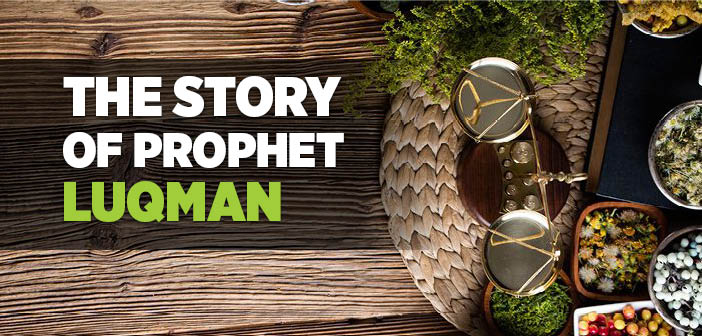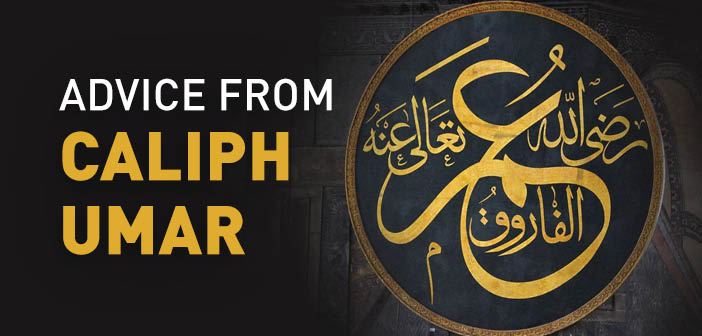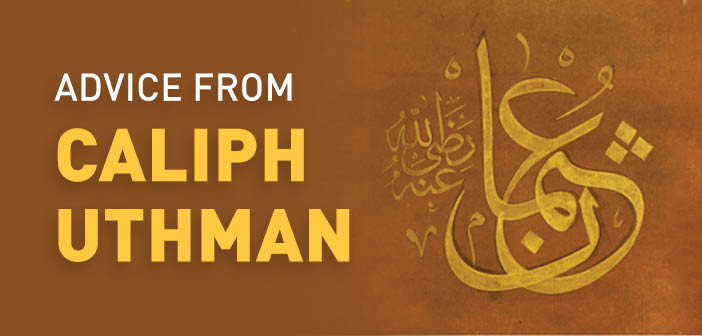
The Story of Prophet Luqman
What is the story of prophet luqman? Who is the luqmans wife?
The Patriarch of Spiritual and Medical Doctors Whose Advices Have Become Legendary LUQMAN THE WISE -peace be upon him-
Luqman (as) may have been either a prophet or a saint. He is the patriarch of doctors.
In the chapter named after him, the Qur’an tells us that Luqman (as) was a man of wisdom:
“Certainly, We gave Luqman wisdom, saying, ‘Give thanks to Allah; and whoever gives thanks, gives thanks only for his own sake. And whoever is ungrateful, Allah is indeed Sufficient, Praiseworthy.” (Luqman, 31: 12)
Shukr, or gratitude, is for the servant to express his joy to the Lord for the blessings he is given, by giving thanks both verbally and physically. Shukr is the recognition of blessings. For that reason, both Islam and its creed (iman) are also referred to as shukr.
It is narrated that Luqman (as) was either Job’s (as) maternal nephew or cousin.[1] Most Islamic scholars suggest he was not a prophet but rather a man of high wisdom or hikmah. Wisdom also implies the natural ability for precision in both words and conduct, which comes as a result of acquiring spiritual maturity after gaining depth in theoretical knowledge. The Almighty declares:
“He gives wisdom to whomever He wishes. And he who is given wisdom, is certainly given an abundant good. But no one takes a lesson except those who possess intellect.” (Al-Baqarah, 2: 269)
Wisdom is to grasp the reality and mystery behind matter. What makes this possible is a ray of divine light that shines upon the heart.
To give an example of Luqman’s (as) wisdom, Zamakhshari explains the following incident:
One day, David (as) asked Luqman (as) to slaughter a sheep and bring him two of its best parts. So, Luqman (as) brought the sheep’s tongue and heart. After a few days, David (as) this time asked him for the sheep’s worst parts. Again, Luqman (as) brought its tongue and heart. David (as) asked why, and Luqman explained:
“When these two are good, there is nothing better. And when these two are bad, there is nothing worse!” (Zamakhshari, Kashshaf, V, 18)
A hadith narrated by Abdullah ibn Umar (ra) states:
“Luqman was not a prophet but a devout man. The Almighty protected him from sins. He used to contemplate a lot. His faith was strong. He loved Allah and Allah loved him…and gave him wisdom.” (Qurtubi, Tafsir, XIV, 59-60)
Imam Malik explains:
“As far as what I have been told, Luqman the Wise was once asked:
‘What is behind the quality we see in you?’
He replied, ‘Honesty, fulfilling my trusts, abandoning things that do not interest me and keeping my word.” (Muwatta, Kalam, 17)
The Qur’an conveys a number of Luqman’s (as) words of wisdom and the advices he gave his son:
“When Luqman advised his son, ‘O my son! Do not ascribe any partners to Allah. Polytheism is indeed a great injustice.” (Luqman, 31: 13)
Ascribing partners to Allah (jj) is truly a great sin that condemns a person to eternal hellfire.
Luqman (as) continues his advices:
“Son! Even if it should be the weight of a mustard seed; and even if it be inside a rock or in the heavens or earth, Allah will bring it forth. Allah is indeed Attentive, Aware.” (Luqman, 31: 16)
A similar verse in the Qur’an states:
“So whoever does an atom’s weight of good will see it. And whoever does an atom’s weight of evil will see it.” (Al-Zilzal, 99: 7-8)
Luqman (as) goes on to say:
“Son! Maintain the prayer, bid what is right and forbid what is wrong; and be patient through whatever may visit you. That is indeed the steadiest of courses.” (Luqman, 31: 17)
The verse lays emphasis on ritual prayer, encouraging what is right, forbidding what is wrong, as well as being patient.
Prayer is a believer’s Miraj. It is one of the most important aspects in the duty of being a servant. Prayer cannot be abandoned even in the heat of battle. The Almighty says the marks of those who prostrate to him are “…visible on their faces.” (Al-Fath, 48: 29). Elsewhere, He tells us to “…prostrate and draw near!” (Al-Alaq, 96: 19)
Aisha (ra) says:
“When the Prophet (saw) stood to pray, you could hear a noise like a boiling cauldron coming from his chest. Once the adhan sounded, it was like he could not recognize those around him, as he was moments away from entering Allah’s presence.” (Abu Dawud, Salat, 157; Nasai, Sahw)
A believer is also obliged to encourage people to do what is right and discourage them from committing what is wrong. Essentially, this is to thank the Lord for all His blessings, above all faith and guidance, by spreading them to others. Through the Prophet (saw) himself, the Almighty teaches us the correct method of making this invitation (tabligh):
“It is by Allah’s mercy that you are gentle to them. Had you been harsh and hardhearted, they would have surely scattered from around you. So excuse them, plead for their forgiveness and consult them in affairs. And once you have decided, put your trust in Allah. Certainly, Allah loves those who trust in Him.” (Al-i Imran, 3: 159)
Regarding the manner of enjoining good and forbidding evil, Allah (jj) also states:
“Invite to the way of your Lord with wisdom and good advice.” (Al-Nahl, 16: 125)
As for patience, it is one of most underlined themes in the Qur’an. Patience is bitter in life but comes with sweet rewards in the hereafter. Every prophet has been put through the sieve of patience. The Almighty states:
“And give good news to the patient.” (Al-Baqarah, 2: 155)
Abdullah ibn Masud (ra) explains:
A man once came to the Prophet (saw) and said:
“Messenger of Allah…I truly love you!”
The Prophet (saw) told him to, “Watch what you are saying!”
“But by Allah, I love you!” the man said, repeating those words three times.
The Prophet (saw) thereupon said:
‘If you love me, then prepare yourself an armor against poverty. For poverty flows quicker to a person who loves me than flood rushing to its target.” (Tirmidhi, Zuhd, 36/2350)
In a way, the Prophet (saw) is saying:
“Since you love me for the sake of Allah, be prepared to endure trials, tribulations and hardships; for love requires the person to follow the beloved in every step of the way.”
The Qur’an goes on to relay Luqman’s (as) advices:
“Do not turn your cheek disdainfully from people, and do not walk exultantly on earth. Allah does not like any swaggering braggart.” (Luqman, 31: 18)
Conceit, arrogance and self-love are traits that are rooted in hell. Grandeur belongs only to Allah (jj). Satan’s arrogance toward Adam (as) and rebellion against Allah (jj) are the reasons why he was expelled from paradise and tasked with leading human beings astray. Again, despite his knowledge of spiritual sciences, Korah was condemned to perish due to his jealousy of Aaron (as).
Luqman (as) also tells his son:
“Be modest in your walk. and lower your voice. Indeed, the ungainliest of voices is the voice of a donkey.” (Luqman, 31: 19)
This teaches believers to be polite and elegant. Rudeness is embodied in the sound of a donkey, which proceeds from high to low pitch. It is an ugly and unpleasant voice that unnecessarily, and excessively, gets louder. To speak in this manner would be crude and uncourteous. Thus, through the verse, the Almighty calls on His servants to be polite in speech. In other words, it is uncouth for a person to raise his voice unnecessarily. He will only end up sounding like a donkey.
Hasan Basri says:
“The pagans use to pride themselves on their loud voices. The Almighty, in a way, said to them, ‘If there was any virtue in having a loud voice, then donkeys would have been superior to you!’”
While politeness may appear petty and unimportant in life, it is narrated that it will carry great weight on the day of reckoning. Therefore, we must abstain from reckless speech and measure the meaning and consequence of every word that comes out of our mouths. The Prophet (saw), in fact, says:
“A person can say something without thinking it through; yet, it could land him in a corner of hell more remote than the distance between east and west.” (Bukhari, Riqaq, 23)
“A servant says something Allah is pleased with, even though he does not think about gaining Allah’s pleasure with it. Still, because of it, Allah will be pleased with the servant until He meets him on the Day of Judgment.
And then a servant says something that warrants Allah’s anger, without thinking it will. Yet, Allah becomes angry with him until He meets him on the Day of Judgment.” (Tirmidhi, Zuhd, 12; Ibn Majah, Fitan, 12)
Between the verses that contain Luqman’s (as) advices, are two others, which are important in giving believers a direction. It is narrated that these were revealed about the mother of Sad ibn Abi Waqqas (ra).
Sad (ra) was a respectful son, who obeyed his mother. When he accepted Islam, his mother protested:
“What have you done, Sad? Know that if you do not leave this religion, I will neither eat nor drink until I starve to death. You will then be known as the man who murdered his mother!”
He responded by saying, “Mother, please…do not do that! I will not abandon this religion for anything!”
His mother did not eat or drink for the next two days. Seeing her become frail, Sad (ra) said:
“My dearest mother! I swear that if you had a hundred lives and lost each of them, one by one, I would still remain within my faith! So, whether you eat or not, is now all up to you!”
Afterwards, his mother resumed eating, and the following two (or the second) verses were revealed:
“We have enjoined man to be good to his parents. His mother carried him through weakness upon weakness, and his weaning takes two years. Give thanks to Me and to your parents. To Me is the return. But if they urge you to ascribe to Me, as partner, that of which you have no knowledge, then do not obey them. Keep their company honorably in this world and follow the way of those who penitently turn to Me. To Me will be your return and I will then inform you of what you used to do.” (Luqman, 31: 14:15) (Muslim, Fadailu’s-Sahabah, 43-44; Ibn Asir, Usdu’l-Ghabah, v. II, p. 368)
Abu Umamah (ra) narrates the following from the Prophet (saw):
“Luqman said to his son:
‘Remain by the side of scholars! Listen to the words of the wise! Just as Allah revives the dead soil with abundant rain, He revives dead hearts with the light of wisdom!’ (Haythami, Majmau’z-Zawaid, I, 125)
Luqman (as) has also advised the following:
“I have served many prophets…and I have chosen eight of their sayings as a summary of their teachings. If you take care to practice these eight things, you will be saved:
Protect your heart during prayer,
…your tongue when with people,
…your hand when eating,
…and your eyes when you are a guest.
Out of the remaining four, constantly remember two of them, while forget the other two.
At all times, remember Allah the Almighty, as well as death. Do not leave them out of your mind even for a moment!
Forget the good you have done to others and the bad others have done to you!
Below are some of Luqman’s (as) other advices as reported in reliable sources:
“Son! Make piety (taqwa) your capital for the hereafter! Piety is a trade that involves no money or property!”
“Son! Attend funerals, for they will remind you of judgment day. Sins, on the other hand, will increase your love of the world!”
“Son! A liar loses the radiance (nur) of his face! Bad traits increase a person’s grief and sorrow!”
“Son! Explaining something to a dim person is harder than moving a heavy rock!”
“Son! Do not send out an ignorant person to represent you! If you cannot find an intelligent and wise person, then go yourself!”
“Son! The world is like a deep sea. Many people have drowned in it. Let piety be your ship, faith your load, reliance your compass and good deeds your provision! If you keep afloat, it is through the mercy of Allah. If you drown, it is because of your own sins!”
“Son! Do not let the rooster outwit you! It wakes up every morning to exalt the Lord, while you are in deep sleep!”
“Once the stomach is filled, reflection falls asleep…and the organs are held back from worshipping!”
“Son! Choose such friends that once you go your own ways, you will not feel the need to speak ill of one another!”
“Protect your friends! Visit your relatives!”
“Son! Three things are known through three things: Gentleness in the moment of anger, courage in the heat of battle and brotherhood in time of need.”
“Comply with your friends except in sin!”
“Son! How are people not afraid of the destined punishment, when they neglect their duty to the Lord every day?”
“Son! Take from the world only what you need. Do not get caught up; it will damage your eternity. Do not entirely abstain from the world, either, as you would then be a burden on people. Stick to fasting, for it curbs desire. But do not fast too much that it holds you back from ritual prayer! For, in Allah’s sight, prayer is better than fasting.”
“Son! Do good to those who can appreciate it. There is no more friendship between good and evil than there is between a wolf and a sheep. He who likes to quarrel will be insulted. He who visits places of sin will draw suspicion. He who goes near evil will not be able to save himself. And he who does not bite his tongue, will regret it.”
“Serve the righteous, and do not befriend bad people!”
“Son! Be trustworthy, so that you become wealthy! Do not appear to others as if you fear God, when your heart is stained with the dirt of sin!”
“Practice what you preach! Otherwise, you will be like the candle that melts away, while giving light to others!”
“Son! If you learn manners when you are young, you will reap the benefits as you grow older!”
“Do not ignore small tasks! For, what is small today becomes great tomorrow!”
“Son! Do not occupy your heart with grief and sorrow! Refrain from greed. Be satisfied and content with what Allah has given, so that your days become beautiful, your heart filled with joy; and you become happy to be alive!”
“Son! Life on earth is short, your lifespan, shorter. And even shorter is what remains of it!”
The Prophet (saw) has said:
“Luqman said to his son, ‘Allah the Almighty protects what is entrusted in His care. And I place you, your property, religion and the outcome of your deeds in the care of Allah!’” (Ibn Hanbal, II, 87)
It is narrated that inscribed on Luqman’s (as) ring stone were the words:
“It is better to conceal what you see than to reveal what you suspect!”
Peace be upon him…
[1]. See, Sa’labi, Arais, p. 391.
Source: The History of Prophets in Light of The Qur’an, THE CHAIN OF PROPHETS, Osman Nuri TOPBAŞ, Erkam Publications
The Creation of Eve














